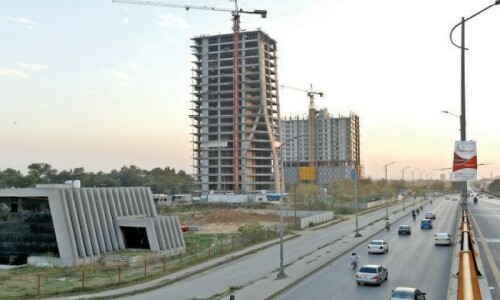ISLAMABAD: The Special Investment Facilitation Council (SIFC) has started work on a plan to replace old government houses with high-rises in Islamabad for generating billions of rupees for the national kitty.
In various sectors of Islamabad such as F-6, G-6, G-7 single-storey government houses are located. In F-6, even spacious houses for higher category officers are located which also have servant quarters.
“If such single-storey houses allotted to federal secretaries and other bureaucrats are demolished, dozens of high-rise buildings could be constructed on these government lands.
“So there is a need for vertical construction approach to save the land bank of Islamabad,” said a government official, wishing not to be named.
Due to the presence of these single-storey houses, a huge chunk of state land is underutilized. A recent study showed that only in one sub-sector of G-6 (G-6/1) government houses were built on 86 acres and with vertical construction the current houses could be accommodated on nine acres, freeing 77 acres worth over Rs52 billion.
Letter sent to CDA for comments after study showed that 77 acres could be freed in G-6/1 alone
The issue of replacing these houses with vertical construction remained in discussion for the last two decades or so; however, no practical step has been taken yet. Last week, SIFC through an official letter sought comments from the CDA on the issue, particularly about G-6/1.
Sources in SIFC told Dawn that a research article released by Pakistan Institute of Development Economics (PIDE) on “dead capital” caught the attention of SIFC. Therefore, it was decided to take up the issue with CDA, which is the custodian of Islamabad’s land.
Sources in the PIDE said through an official letter last week, the CDA was asked to furnish its comments on the issue.
The SIFC’s letter available with Dawn stated: “Enclosed please find a self-explanatory article on the topic of Dead Capital, authored by research associate at the Pakistan Institute of Development Economics.”
The letter added: Reference this topic, efficient management of state-owned land is essential to meet urban demands and promote city development. When underutilized or used for non-productive purposes, such land becomes a financial burden, restricting growth and economic potential. In Pakistan, much of this land lies in or near urban centres, yet it remains largely unoptimized — a clear case of dead capital as defined by Hernando De Soto.“
According to the letter, a study by PIDE highlighted that government housing in Islamabad’s G-6/1 area occupied 86 acres of valuable land.
“By converting single-storey houses into high-rise structures, up to 77 acres could be freed, potentially generating 55.2 billion in revenue and raising annual GDP by 0.09pc.
The PIDE study says that these government houses located on 86 acres could easily managed in six high-rise buildings and by doing this 77acres could be freed.
“This strategy already applied by countries like the UK and India requires a strategic shift in Pakistan. Establishing a centerlised database for state-held land, accurately valuing these assets and involving asset management experts can help unlock this dormant potential, fostering economic activity and addressing urban needs through efficient, vertical development,” read the letter.
“In the light of above, the CDA is requested to provide their views/comments on the subject. These views/comments may please be forward to SIFC Division.”
The sources in SIFC said the plan of replacing the government houses with vertical construction was for the time being a raw one as “we sought comments from CDA and once we received their comments we will look into this issue. Let see what happens, but one thing is clear in all major cities of the world government opts for vertical construction,” said a source in SIFC.
As far as the issue of Islamabad is concerned, “the research article of PIDE caught the attention of SIFC, therefore, we sought comments from the CDA,” the source said, adding the research article, “Dead Capital” authored by research associate Azwar Mohammad Aslam had also been shared with CDA along the official letter of SIFC. “After receiving CDA’s input, we will move forward,” the source said.
Published in Dawn, November 11th, 2024












































